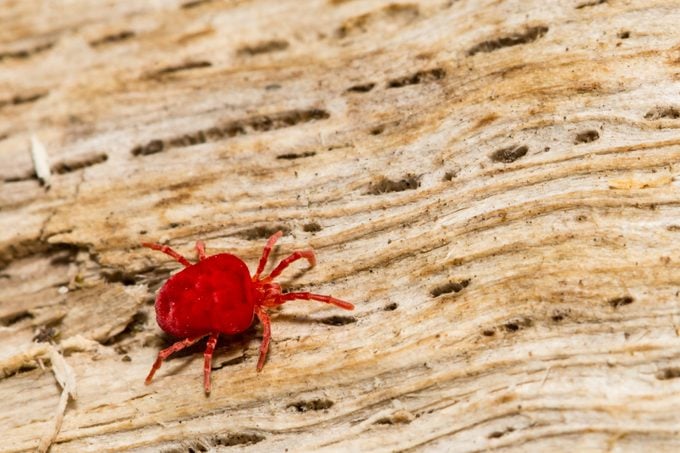How to Get Rid of Chiggers
Updated: Nov. 10, 2022
You may never see a chigger, but you'll be scratching for days after you get bit. Here's how to get rid of these teeny-tiny ankle biters.
What’s a chigger?
Surprise, a chigger isn’t even an insect. They’re actually an immature mite, so they are super tiny—just 1/150th of an inch. Unless you’re sporting a magnifying glass, you’re probably not going to see one. Some people call them red bugs because of their bright red color but they can also be orange, yellow, or straw color. The juvenile chiggers are ones that bite and once they do, it itches something fierce.
Where do chiggers live?
If you want to know how to get rid of chiggers you have to know where they prefer to hang out. They gravitate towards dense vegetation. “Chiggers are most abundant in vegetational transition zones such as the junction of forest and grass, in swampy areas and thickets,” says Jim Fredericks, PhD, chief entomologist and vice president of technical and regulatory affairs for the National Pest Management Association. Chiggers are found just about anywhere across the United States, but their larval activity (biting stage) varies depending on the region and climate. So, if you live in Michigan, the larval activity may be around two months, but if you reside in Florida, chiggers could be a year-round nuisance.
Where they bite
Chiggers bite animals and humans and they’ll wait in a shaded spot close to the ground (and your ankles) until they find a host. They’re attracted to the carbon dioxide we exhale, so all we have to do in stumble into their habitat to give them the green light to bite. Chiggers tend to gather where clothing is tight, like socks around the ankle or a belt on our waist. Once they find a suitable spot, they pierce the skin around the hair follicles and release a skin dissolving saliva, and the chiggers feed on that liquid. Their bite causes intense itching but at least they don’t suck our blood like bed bugs do.
Keep chiggers off your skin
If you’re headed into chigger-loving habitats, spray exposed skin with an insect repellent. Don’t forget to spray the spots where chiggers get access to the skin from your socks, top of shoes or boots, waistbands, cuffs, and collars. Texas A & M Cooperative Extension recommends using insect repellents that have DEET. Keep in mind if you’re using sunscreen too the U. S. Centers for Disease Control and Prevention recommends applying the sunscreen first and letting it dry for about five minutes before applying repellents with DEET in them. Repel lasts for up to ten hours but you may need to reapply if you get wet or sweaty. If you’d rather opt for a chemical-free repellent, give one of these options a try.
Spray your clothes
Add even more protection by spraying any clothes that will touch vegetation as your working or walking in chigger habitats. Clothing yourself with an armor of protection with long pants that are tucked into boots or socks and long-sleeved shirts with tight cuffs is how to get rid of chiggers too. You may want to spray your picnic blanket or backpack as chiggers can infest any object that touches the ground. Texas A & M suggests using sprays specifically for clothing that contain permethrin. Try Sawyers Premium Permethrin Clothing Insect Repellent, but only use it on clothing or gear, never your skin.
How to get rid of chiggers on your skin
Chigger bites itch but you may not start scratching until a few hours after they’re done biting. You might remove some chiggers by scratching but their mouthparts could remain and continued scratching could lead to a secondary infection. Clemson College of Agriculture, Forestry and Life Sciences has a better plan. Hop in the shower ASAP and lather up the areas where you got bit. Rinse and repeat. Next, slather on some antiseptic cream. Thankfully, chiggers in the United States aren’t’ known to transmit any diseases. After you dry off, try one of these home remedies to stop itching.
How to get rid of chiggers in your backyard
Chiggers like more dense and humid vegetations, so if you have areas of overgrown shrubs or twig piles with weeds here’s your motivation to put on some garden gloves and get to work. “Homeowners should remove brush and thickets, and be sure to keep the lawn mowed, as these tactics will help reduce chigger populations,” says Fredericks. When you keep your grass short and garden plants trimmed it raises soil temperatures and lowers the humidity—a combination chiggers don’t fancy.
Lawn treatment for chiggers
It may be tempting to pick up some insecticide sprays and saturate your lawn, especially if you have a lot of overgrown vegetation but Fredericks says habitat alteration is the most important factor when it comes to getting rid of chiggers. But in some cases, pest control pros may recommend insecticides after a survey of the area deems it would be helpful. According to Texas A & M insecticides containing bifenthrin, carbaryl, diazinon or permethrin may be necessary. But steer away from granular varieties they say because they’re just not as effective as spray formulations.

